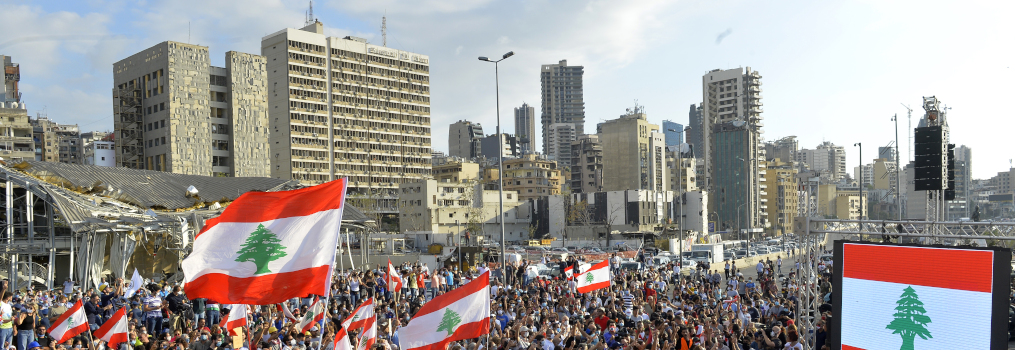Just over a week after the devastating explosion on August 4 that ripped through the Lebanese capital, Parliament voted overwhelmingly in favor of extending a state of emergency across Beirut until August 21. Cabinet and President Michel Aoun had announced the state of emergency the day after the explosion, and Parliament’s vote confirmed the decision, putting it in full effect.
The explosion at the Port of Beirut represents a knockout blow to the country, which was already overwhelmed by a crippling economic crisis. With over 170 killed, 6,000 wounded, dozens missing, and hundreds of thousands homeless, President Aoun estimates that repairing these damages will cost over $15 billion.
Riots and protests took place in the heart of the capital over the weekend, with demonstrators briefly occupying some ministries, leading to Prime Minister Hasan Diab’s resignation Monday following a series of individual ministers resigning. It is apparent that a critical and angry Lebanese populous, now seeking accountability and even vengeance for the Beirut blast, is a key motivator behind the decision to declare a state of emergency in the heart of the country.
Sweeping military power and legal ambiguities
Since March, Lebanon has been under a “state of general mobilization”, in which the government implemented a series of measures to prevent the spread of the COVID-19 virus, including curfews and regulations related to traffic and businesses. These measures have been tightened and loosened following bi-weekly and monthly evaluations by the authorities.
A state of emergency takes all this to a new level, as per Decree 52 issued in 1967. Unlike a state of general mobilization, Parliament must review and approve a cabinet’s declaration of a state of emergency within an eight-day period. State of emergencies can be renewed, and there is no maximum period of time it can be in effect.
More importantly, it gives the Lebanese Army sweeping power to implement measures, with other security agencies at their disposal. Among these powers is the authority to enforce home searches at any time, deport suspects, issue house arrests, ban gatherings that they deem security threats, impose curfews, and even censor press and media that publishes material that is considered a threat to security.
These provisions are at the army’s disposal once a state of emergency is put into effect. Civilians violating any of the above are investigated and tried in military courts, expanding an already problematic court system that does not exclusively try military personnel. Those found guilty face fines or prison sentences ranging from ten days to one year—or longer depending on the crime.
Control by any means necessary
While it is unclear to what extent the Lebanese Army will exercise these various powers, there is justifiable great concern that further repression would stifle basic human rights. This especially applies to the rights to free assembly, expression, and press; all continue to worsen in Lebanon through intimidating legal measures and physical violence.
The streets of downtown Beirut might not resemble the countrywide revolution that the world witnessed in late 2019, but the worsening economic crisis and now the Beirut blast have intensified anger towards the government and ruling parties, leading to protests and riots. Security forces have responded with far more force, resorting to excessive tear gas, rubber bullets and birdshot pellets, and even live ammunition. During last Saturday’s riots, at least 14 journalists and media workers were attacked at the hands of the security forces.
For the Lebanese government, this also means greater criticism towards their handling of the Beirut blast, whether it is the handling of the investigation, the minimal support to those affected, or even the emerging details surrounding awareness of the potential of such an explosion.
Currently, the country’s ruling parties are trying win back trust for much needed aid to make the economy viable again. More dissent on the streets and investigation into corruption, negligence, and nefarious practices would not do them any favors.
Increased surveillance and clampdowns under a state of emergency would provide the state much-needed legal backing to quell popular anger under the pretext of the Beirut explosion, its investigation, and the security concerns that come about as a result. And while the government tries to appease frustrated international donors by expressing its ongoing commitment to reforms—notably combatting corruption—there can be no meaningful reform without human rights.
